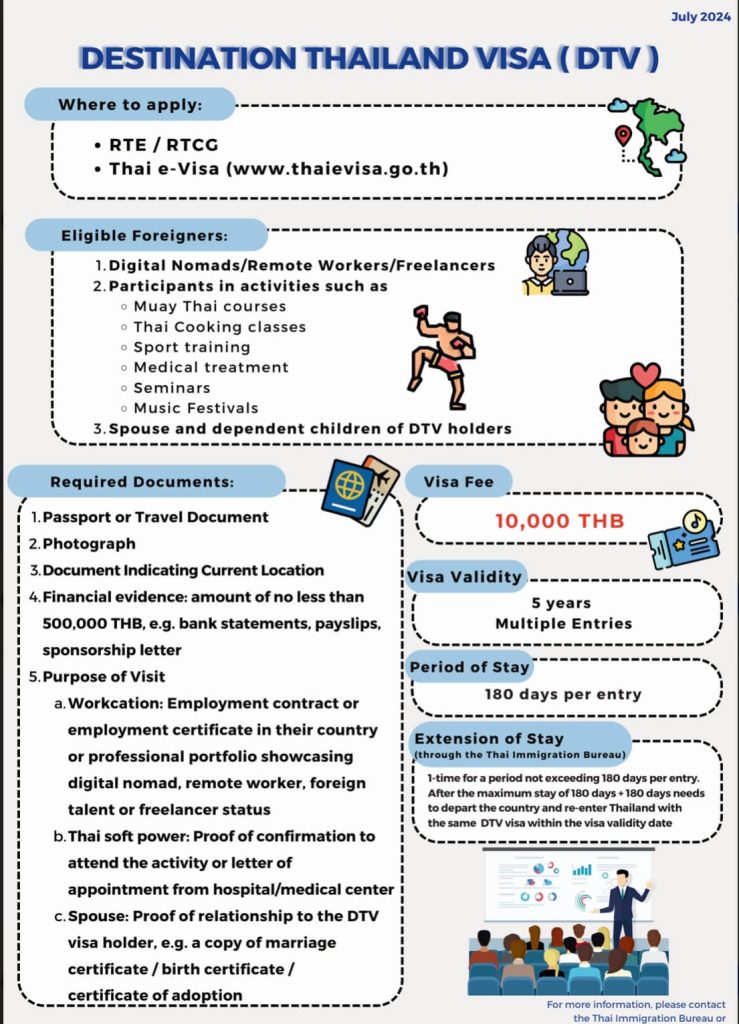DTV VISA FAQ
🌍 Destination Thailand Visa (DTV) – Frequently Asked Questions
1. What is the DTV?
The Destination Thailand Visa (DTV) is Thailand’s digital nomad visa, designed for remote workers, freelancers, investors, or those engaging in Thai soft-power activities (e.g. Thai cooking classes, Muay Thai). It allows stays of up to 180 days per entry, extendable once, for a total of one year per entry.
2. Who is eligible?
Digital nomads, remote workers, freelancers, investors, and those interested in Thai cultural experiences or medical tourism.
3. Can I work in Thailand?
Yes, but only for overseas clients or your own foreign-based company. Thai employment is not permitted. For Thai work, you must obtain a Non‑Immigrant B visa and work permit.
4. Can I study on DTV?
You cannot enroll in full academic programs. However, non-degree courses— Thai culinary training, Muay Thai, or Thai soft‑power activities—are allowed.
5. Can I start a business?
Yes, you can be a shareholder in Thai companies. You cannot, however, work as a director or employee unless you obtain a work permit.
6. Can I buy property?
You can own a condominium or house, but not the land beneath it—foreigners are restricted from owning land.
7. What financial requirements apply?
- You must have at least THB 500,000 in cash on deposit for 3 months prior to application.
- Investments, stocks, or non-liquid assets do not count .
8. How much is the fee?
- Application fee: typically, THB 11,000 – 13,000 (one-time payment).
- This fee allows multiple entries over the visa’s 5‑year validity, with each entry allowing up to 180 days.
9. Where can I apply?
- You cannot apply within Thailand.
- You may apply at Thai embassies or consulates abroad—including in neighboring countries—and then re-enter Thailand under the DTV.
- Some nationalities must submit applications in their home country.
10. What about extensions?
- You may apply for a 180‑day extension once you’re in Thailand (via immigration office, fee ~THB 1,900), unlimited times, as long as you meet current requirements (updated bank statements, etc).
- Alternatively, border‑runs are accepted if you do not meet documentation requirements.
11. What is the tax implication?
- Staying in Thailand for more than 180 days a year classifies you as a Thai tax resident.
- You must pay taxes on foreign income—whether those taxes are due depends on Thailand’s double taxation agreements with your home country.
12. How long is the visa valid for entry?
You have up to 5 years from approval to activate your visa with an initial entry. From that moment, each 180‑day stay counts toward your visa validity.
13. What documents are typically required?
- Valid passport
- Proof of THB 500,000 cash in Thai bank account for 3 continuous months.
- Portfolio or proof of remote/freelance or soft‑power activity.
- Completed application form and two passport‑size photos.
- Paid application fee(Check the embassy’s consulate for any additional or updated requirements.)
14. Can I apply again after visa expiry?
Yes, you can reapply after your 5‑year visa expires.


